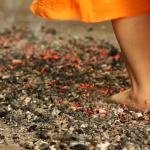We are in the midst of an unprecedented transformation in witchcraft, where we have the freedom to claim the title for ourselves and openly discuss our practices. While all of us involved in this personal and societal revolution may have a common bond in calling ourselves witches openly, there are lingering dangers in making assumptions about those with us on this wild broom ride. In particular, assuming familiarity, such as by calling complete strangers things like “brother” and “lady,” and the still-with-us belief that only women can be witches, causes damage to those whom with we wish to have kinship and to ourselves.
The Blessing And Bane of Assumptions
Assumptions play an important role in decision making. If we lacked organizational rules for interpreting ourselves and others, we simply could not function. These thought forms, known by names like heuristics and working models, can have a great deal of power. As a witch, I interpret their energetic properties as a unique spirit that is a force to be reckoned with like any other. Like all energy, assumptions carry emotional and behavioral connectors with them. Also like all spirits, they are neither good nor bad. It’s what we do with them that matters. I have kept The Four Agreements on my fridge door for years as a reminder that assumptions need to be examined. Don Ruiz wasn’t so much telling us to undo evolution, but to take a moment to consider our thought forms before inflicting them on ourselves or anyone else. The much overlooked fifth agreement is to be skeptical, as we should be about our assumptions.
The Harm Of Making Assumptions About Groups
Assumptions can make us dislike and avoid certain groups. We have evolved our decision making skills to help us identify friends and foes. This makes perfect sense when our survival depended on snap choices about whom we could trust. We still do this constantly, even those of us who are earnestly working to get over our biases. Again, there is nothing inherently wrong with thought forms and assumptions, except when they harm others. Of course, this is the essence of racism, homophobia, sexism, ableism, etc. Fundamentally, all these types of discrimination are the expressions of biases against groups whom we believe aren’t like us. Add in the patriarchy and these become institutionalized methods of oppression. I’ve written about the problem of whitewashing in modern witchcraft elsewhere.
Why Kinship Matters
Being able to identify with those like us has social and spiritual value. Our relationships largely influence our state of being. As witches, pagans and other types of wildfolk, we typically reject what we perceive to be the values of mainstream society. Outsiders and outlaws by birth, we may isolate ourselves from just about everyone else. Isolation can be a form of addiction, protecting us from both the beauty and pain of interpersonal relationships. It’s my personal drug of choice when the world gets too much. I know many others who feel the same way. I’ve heard from many practitioners who choose to be solitary because engaging in groups was just far more trouble than it was worth. However, there is real benefit in belonging to a group that is safe, supportive and enjoyable.

















